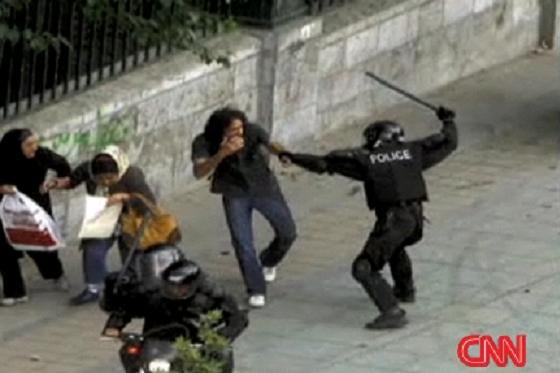

Foreign news outlets banned from covering the post-election protests in Iran are turning to Twitter and Facebook to find out what is happening.
The Iranian government yesterday barred foreign journalists from leaving their offices to cover rallies in Tehran in the wake of last weekend’s disputed presidential election.
Pro-reform candidate Mir Hossein Mousavi and his supporters accuse the government of rigging the election to declare hard-line President Mahmoud Ahmadinejad the winner.
The BBC complained at the weekend that the Iranian authorities appeared to be blocking the satellite signal for its Persian TV service, in an attempt to block coverage of the elections’ aftermath.
In a follow-up post on the BBC editors’ blog, BBC News website editor Steve Herrman said: “Heavy restrictions have now been placed on the BBC and other foreign news organisations.
“Reporters are not allowed to cover unauthorised gatherings or move around freely in Tehran – though there are no controls over what they can say.
“Although they are facing difficulties, they have been filing regularly and their reports have appeared on radio, TV and online.”
As a result of the news blackout, blogs and social networking services such as Facebook and Twitter have been vital conduits for Iranians to inform the world about the protests.
“It should be noted that the majority of messages on Twitter, both within Iran and abroad, are from Mousavi sympathisers – a factor we need to allow for,” Herrman wrote.
“There’s no filter or editorial process other than the capacity of those involved to correct or contradict each other.”
He added: “What really stands out is the range of sources, voices and angles to be looked into.
“There’s no hierarchy: everything’s on merit, and there is of course a new set of challenges for our staff – chiefly editorial challenges, as well as a kind of chase as social media services appear and disappear.
“We’ll check anything we want to include in our account of what is actually happening.
“But we also want to link what we do with the flow of discussion, links, rumours and reports which is providing another channel for people following the story.”
Skynews.com head of newsgathering Phil Wardman said the network was reliant on Twitter as a news source as official communications had been cut off or heavily curtailed.
Earlier this year, the rolling news channel hired a dedicated “Twitter correspondent” whose job is to monitor the social network and feed eyewitness accounts into breaking stories.
“It’s one of very few ways that people inside Iran can get their voices heard,” Wardman said of Twitter.
“While the Iran authorities try to clampdown on the streets, broadcast and mobile phone communications, people there are still finding ways to get their stories out.
“Twitter especially is giving them a forum to discuss and share information among themselves.
“As one of the contributors said: ‘we only trust what we hear from each other’.
He added: “Ruth Barnett, our Twitter correspondent, has been monitoring and feeding in Twitter to the Sky News website for the past two days on Iran.
“It has become a very important tool.”
CNN Iran correspondent Reza Sayah said the Iranian government-run TV channel, Press TV, was not affected by the restrictions and aired live coverage of Tuesday’s rally in support of Ahmadinejad.
“Iran’s government had criticised some of the media coverage and images, describing them as biased,” he said.
“International news outlets including CNN can talk about rallies in their live reports, but they are not allowed to leave their hotel rooms and offices.”
At least 10 Iranian journalists have been arrested since the election.
Reporters Without Borders secretary general Jean-Francois Julliard said: “We are very worried about them, we don’t know where they have been detained.”
Email pged@pressgazette.co.uk to point out mistakes, provide story tips or send in a letter for publication on our "Letters Page" blog

